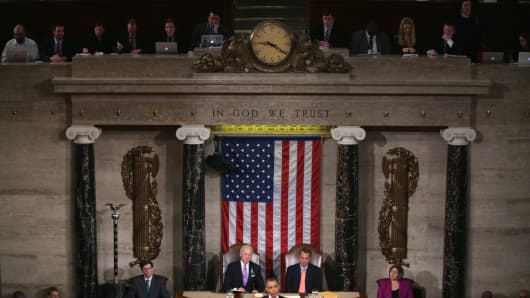President Obama laid out his plan on how to strengthen and grow the U.S. economy in his State of the Union address Tuesday night. But at what cost?
To get the full breakdown of what the State of the Union means to the American taxpayer, The National Taxpayers Union Foundation (NTUF), the research affiliate of the moderate, conservative group, The National Taxpayers Union (NTU), went through the speech in a line by line cost analysis and gave CNBC.com the exclusive results.
Pete Sepp, Executive Vice President of the NTU said the group looked at 40 items mentioned in the speech that could have a fiscal impact. While 23 items could not have a cost assigned to them (such as rewarding high schools who develop partnerships with universities and companies) because they have unknown costs, Sepp said items such as the President's 'Fix It First' infrastructure program comes at a hefty price tag.
"This is a slush fund that has a lineage back to the 2009 stimulus and more recently the President's Jobs Act from the last Congress; back then CBO scored it at $39.16 billion over five years, which breaks down to $7.832 billion on an annualized basis."
Passage of the remainder of the Jobs Act, Sepp added, would be an annual expenditure of $15.32 billion.
As expected, the president said he would seek additional tax revenue in an effort to chip away at the deficit.
"To hit the rest of our deficit reduction target, we should do what leaders in both parties have already suggested and save hundreds of billions of dollars by getting rid of tax loopholes and deductions for the well-off and the well-connected," Obama said. "After all, why would we choose to make deeper cuts to education and Medicare just to protect special interest tax breaks? How is that fair? Why is it that deficit reduction is a big emergency, justifying making cuts in Social Security benefits, but not closing some loopholes? How does that promote growth? Now is our best chance for bipartisan, comprehensive tax reform that encourages job creation and helps bring down the deficit."
(Read More: Obama Challenges GOP, Presses Big Agenda at State of the Union)
Sepp responded to the President's speech saying the tax proposals were vague, but "contained enough buzzwords to bear a close resemblance to the tax reform blueprint he put out last year, which in turn draws from previous administration plans. The window-dressing changes, but not so much what's behind it."
The President's 2012 framework proposed a reduction in the corporate tax rate, but included numerous tax increases, such as denying the commonly used section 199 manufacturing deduction only to oil and gas companies, which was scored as a 10-year $14 billion tax hike in comparable Senate legislation last year.
Obama proposed his tax reform framework along side a budget that envisioned $1.6 trillion of tax hikes over the next decade, Sepp said, "often affecting both 'C' corporations and 'pass-through' entities that pay taxes on the 1040 individual tax form."
Energy policy was another big theme emphasized in the State of the Union and Sepp said based on the NTUF analysis he saw a lot of contradictions in energy policy. "The president seems to want to have it both ways. He wants to celebrate gains in the development of natural gas and oil exploration all while continually proposing punitive measures that would curtail this very same development in the future," he said.
According to Sepp, the biggest outlay of all the proposals mentioned was the estimate for comprehensive climate change. "The President mentioned The America's Climate Security Act of 2007 sponsored by Senators McCain and Lieberman," Sepp said. "The CBO estimate for outlays alone resulting from a version of this bill was $56.48 billion a year! That's a gigantic chunk of our annualized figure."
In the end, Sepp said anyone looking for dramatically new fiscal policy themes in this speech would be "hard pressed" to find them.
"The proposals were are all too familiar to over burdened taxpayers who remain concern the president's agenda would lead us to higher deficits and taxes," he said. "The President has said his proposals would not add to the deficit. Our estimates are conservative, so if he is serious about not adding to the deficit he will either have to dramatically raise taxes or cut spending in order to achieve this."


